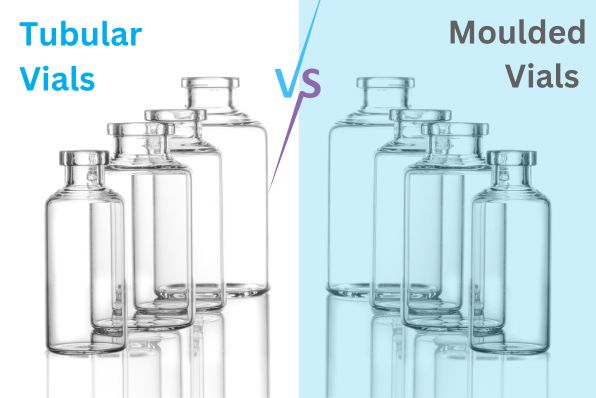


Vials are essential containers that store and handle liquids, samples, and reagents, making their reliability crucial for various scientific processes. In laboratory science and pharmaceutical manufacturing, the quality and type of vial used can significantly impact the accuracy of results. Poor-quality vials can lead to contamination, inaccurate measurements, and compromised sample integrity. This comprehensive guide explores the key differences between tubular vials vs moulded vials and the advantages of tubular vials over moulded vials, shedding light on why choosing the right type of vial is crucial for various applications in drug development and biomedical research.
Moulded vials are created by melting glass and blowing it into moulds to achieve the desired shape and size. This method produces vials with variable wall thickness and may result in inconsistencies in the vial structure. Moulded vials are commonly used in applications where high precision and uniformity are less critical.
Tubular vials, on the other hand, are manufactured by drawing glass tubing to the specified dimensions and cutting it into pieces. These vials are known for their uniform wall thickness and high precision. Due to their enhanced durability and resistance to thermal shock, they are preferred in scientific and medical applications.
The fundamental differences between tubular vials vs moulded vials lie in their manufacturing processes and the resultant product quality. Tubular vials provide consistent wall thickness, which is crucial for high-precision applications, unlike moulded vials, which can vary. Tubular vials have fewer interactions with chemicals stored within due to their smoother surface and cleaner manufacturing process.
| Feature | Tubular Vials | Moulded Vials |
| Wall Thickness & Uniformity | Consistent wall thickness | Inconsistent wall thickness due to the manufacturing process |
| Chemical Resistance | High chemical resistance | Low chemical interactions |
| Manufacturing Process | Produced by drawing and cutting glass tubing, leading to high precision and consistency | Created by pouring molten glass into moulds, which can lead to variability in vial shapes and sizes |
| Optical Clarity | Higher optical clarity | Variable optical clarity |
| Thermal Stability | Better thermal stability | Less thermal stability |
Both tubular and moulded vials are made from borosilicate glass, USP type 1, clear or amber-coloured, which offers excellent thermal and chemical stability. However, Tubular vials benefit particularly from the high-quality borosilicate glass due to their manufacturing process, which enhances their chemical durability and performance. At Borosil Scientific, 100% Schott Glass tubing is used to ensure the best quality products for our customers.
Tubular vials offer several advantages that make them superior for critical environments. Some of these include –
When selecting a vial for laboratory use or pharmaceutical applications, consider the following:
Choosing between tubular vials vs moulded vials depends mainly on the specific needs of your laboratory or production process. Tubular vials, with their superior precision and consistency, are often the preferred choice in environments where every microliter counts. At Borosil Scientific, we understand the critical role of the suitable vial in scientific discovery and product safety. Our range of high-quality tubular vials meets the stringent demands of modern laboratories and pharmaceutical companies. This ensures that your scientific and manufacturing processes lead to accurate and reliable outcomes. Explore our options today to find the perfect solution for your needs.